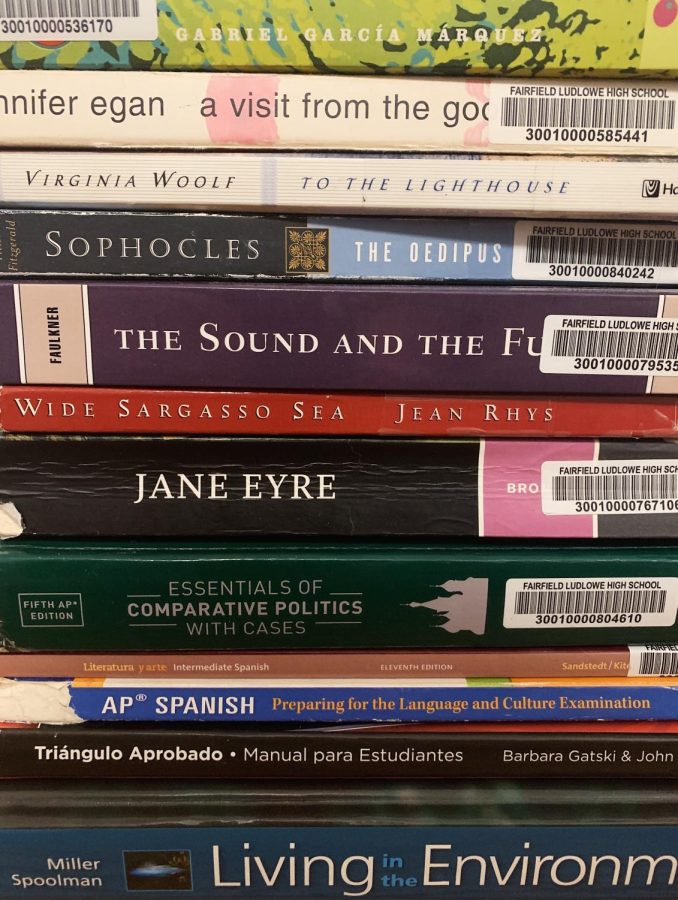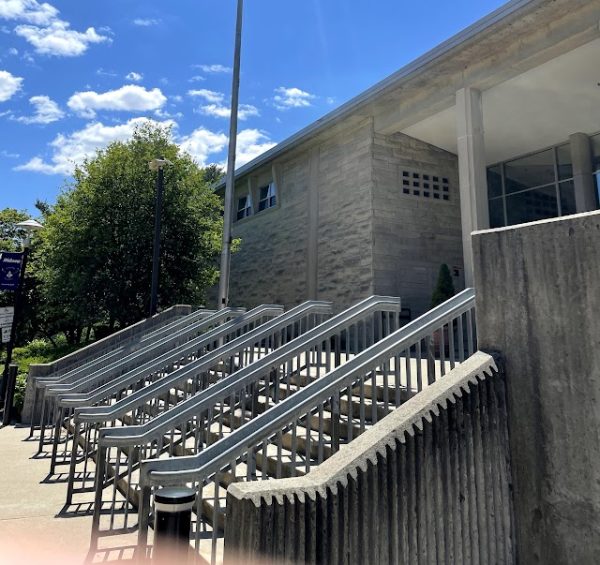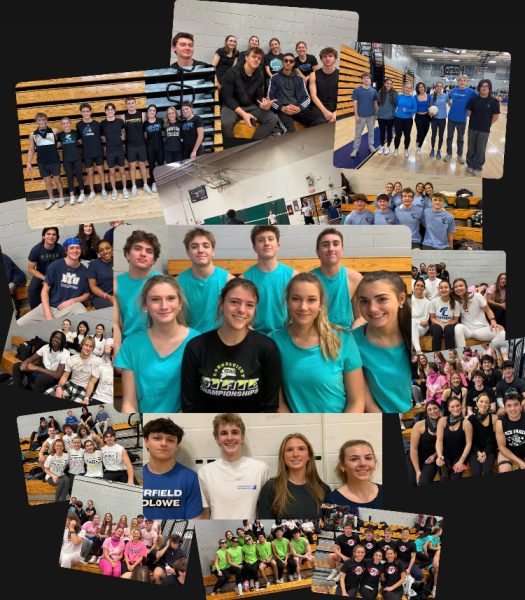Tips to Succeed In Your Classes This Year
Utilize your resources when you need help in your classes. Upperclassmen are also always there to help!
High school can be incredibly challenging at points, especially after two abnormal years due to COVID. As seniors this year, we are wrapping up our studies at FLHS and preparing to move onto new experiences. However, over the past three years here we have worked our way through intensive workloads and challenging classes. So, we are now here to spread a bit of wisdom and share tips that we have gathered from our own experiences.
English 10 H
Honors English in sophomore year is one of the harder classes that you will ever take during your time in high school. The biggest tip to succeed in this class is to have a schedule and to complete the work. Oftentimes, you will be loaded with work, so it is important to create a schedule and divide your work evenly. Do you really want to read 100 pages of a book the night before? Spread the reading up into several different increments before the due date. Lastly, go to writing conferences! Show your teachers that you care about the class, and take the opportunity to ask your teachers what you can be doing to better improve your writing.
AMSTUD
AMSTUD, or American Studies, is a combination of AP Language and Composition and AP United States History. It is a very interesting, interactive, and intense class that is perfect for people who love the intersection of history and literature. In order to be successful in this class, it is necessary to keep up with the material, especially on the history side because there is so much material to get through in a very short amount of time. On the English side, it is important to read the books that are assigned and to participate in class discussion in order to build a more complex understanding of the literature. See more detailed advice for AP Language and Composition and AP US History below.
AP Language and Composition
Like the advice for English 10 H, have a schedule, do the readings, and go to writing conferences! Specifically for AP Language and Composition, though, there are three distinct types of essays. As the class does not hone in on AP style essay writing until later in the year (for AMSTUD at least), take the initiative and start practicing writing these timed essays. We recommend going to the College Board and finding examples of timed essays in the past in order to get a feel of writing in a timed manner.
AP United States History
AP United States History is a fast-paced class that has heavy emphasis on details! That said, we would highly encourage you to supplement your learning with online resources such as Heimler History! Oftentimes, classes dive extremely deep into a specific topic, which is important when you’re responding to free response questions (SAQ/DBQ/LEQs)! However, we would encourage you to watch Heimler History review videos in order to get a birds-eye review. By doing this, you can more easily contextualize what you learn in class!
AP Modern European History
If you have taken AP US History (APUSH), then AP Modern European History should come easily! AP Modern European History, unlike APUSH, has a heavy emphasis on trends and big ideas. As APUSH only focuses on one country, there are a lot of minute details and information that you might need to memorize. APMEH, however, deals with a lot of cause and effect and overall trends as it focuses on the entire European continent. Therefore, when studying, start with a broad focus on big ideas before narrowing in on specific details! When answering multiple choice questions, a lot of the questions can be answered without even reading the stimulus! Read the question, and select what you think is the best answer! Then, we would recommend going back to skim the stimulus to make sure you got the correct answer. If all else fails, go with your gut and don’t change your answer!
Geometry
The class of the infamous “proof”… People like to say that you are either good at algebra or good at geometry, but do not fret, my algebra fanatics, because we did not find this to be true. Geometry is difficult because a lot of the material you are learning is unlike what you have been doing in math for the past few years. Practicing problems and memorizing the rules you need to know, or the steps to specific cases in proofs is super important in order to succeed in this class.
AP Calculus AB/BC
AP Calculus is definitely the class for someone who enjoys math and wants to delve deeper into the subject. There is a lot of new material and skills to be learned throughout the year that have never been taught in math classes prior to Calculus. Since there is a lot of new material to learn, the class does move very quickly. It is vital to do the practices that are given and to reach out for more practice if this is insufficient. The only way to really get good and understand what is going on is to practice. Much of the new material at the end of the year builds on what you learned at the beginning, so it is necessary to make sure you are understanding the material early on and not getting lost in it.
AP Physics 1
Physics is an intense class, especially at the beginning of the year when you are first getting into it. Something that is super important is to reach out to your teacher as soon as you begin to get confused or stop understanding material because a lot of it builds progressively, especially the material that you are learning at the beginning of the year. Many of my peers found it helpful to supplement their classwork with another outside source to learn and master the material such as Khan Academy.
AP Chemistry
Chemistry is a super material-dense class. There is definitely a lot to learn in a short amount of time, which means it is crucial to stay on top of the work and keep up with the class. In particular, the class time and teacher instruction majorly helps to understand the textbook reading and new material. Understanding the concepts behind the math problems or chemistry facts is also super important for assessments and the AP test. Doing practice helps with the parts of the class that involve math, but also delving into the textbook and reading up on the concepts is an important part of succeeding in this class.
AP Economics (Macro and Micro)
Economics is such a rewarding class in the long-run, but there is a lot of material that can come at you quickly. The biggest advice for economics is whenever possible, draw out a graph! In Economics, specifically, macroeconomics, it can get really confusing with all the information the problem gives you. Therefore, simplify it by drawing a quick graph. Most content in economics can be shown through a graph—supply and demand, money supply, cost curves, etc. In addition, in macroeconomics, a lot of the concepts are related. That said, a lot of the graphs that you learn will somehow intertwine (such as money supply, loanable funds, and aggregate demand/aggregate supply models)! Therefore, getting a grasp of the fundamental concepts is essential to success in the class. There are also a ton of external resources that can help you in the class, such as Jacob Clifford! He has a ton of YouTube videos that dives into exactly what you need to know in order to score a 5 on your AP exam! Apart from that, he also has his Ultimate Review Packet, which if you choose so, could be a great supplementary resource for the class.
Financial Literacy
Financial Literacy is a great class to prepare for the real world financially. Like other classes, it is important to take good notes to fall back upon! If you are interested in anything business-related, it is extremely rewarding to be able to contribute to discussions. Every class generally begins with a discussion of what is happening in the market. As a result, try to stay “in-the-know” with what is happening in our world because it makes the class so much more interesting!
Hopefully, these advice and tips will help you with some of your classes! Overall, the biggest advice is to treat your teachers as your go-to resource! They are the ones that are teaching you the material; they are also the ones that are writing the test! That said, if you have any questions, they should be the first person you reach out to! There are also tons of other resources in the school, such as National Honor Society or Math Honor Society that can tutor you! Utilize your resources effectively in order to succeed in your classes!

Charlotte is the Spotlight Column Editor for Prospect. In 2020-2021, Charlotte was the Consumer Reviews Editor.

Allen is the Advertising Editor for Prospect. This is his second year on the Prospect staff.






